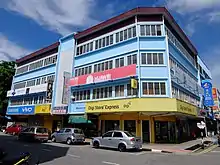Digi Telecommunications
Digi Telecommunications or Digi.Com Berhad (d.b.a. digi; MYX: 6947), is a mobile service provider in Malaysia. Its largest shareholder was Telenor ASA of Norway with 49%. On 24 May 1995, Digi became the first telco in Malaysia to launch and operate a fully digital cellular network.
 | |
| Type | Public limited company |
|---|---|
| MYX: 6947 | |
| ISIN | MYL6947OO005 |
| Industry | Telecommunication |
| Founded | 1995, Publicly listed 1997, known as Mutiara Swisscom Bhd. The name of Digi Swisscom Bhd., the holding company of Digi Telecommunications Sdn. Bhd., was changed to Digi.Com Berhad in 2000 |
| Headquarters | D'House, Subang Hi-Tech Industrial Park, Shah Alam, Selangor |
Key people | Haakon Bruaset Kjoel, Chairman Albern Murty, CEO |
| Products | Telecommunication Services Mobile Services Cable Television |
| Revenue | |
| Total assets | |
| Total equity | |
Number of employees | 1,473 |
| Parent | Telenor Group |
| Subsidiaries | Digi Telecommunications Sdn. Bhd. Pay By Mobile Sdn. Bhd. |
| Website | www |
They were also the first to offer GPRS (2.5G) and later EDGE (2.75G) in Malaysia on 14 May 2004. DiGi primarily uses the 1800 MHz band for GSM with the network code of 502-16.
Digi is listed on the Bursa Malaysia under the Infrastructure category act.
It uses the native dialling prefix identifier of "010", "011 16000000 through 16499999", "016", "0143", "0146" and "0149", although with the implementation of mobile number portability mandated by the Malaysian government this does not apply to subscribers who switched from their old mobile service provider over to Digi. At the moment, switching to Digi is free.
On 21 June 2021, Axiata, Telenor and Digi agree to a potential merger of Celcom and Digi to create a stronger telco in Malaysia, coming after advanced discussions that took place two months earlier. If approved, the merger will be completed by the second quarter of 2022.[2][3][4]
Coverage, Products and Services
Digi operates 2G EDGE, 4G LTE and 4G LTE-A networks.
As of December 2017, Digi has 4G LTE coverage of 90% on populated areas,.[5] LTE-Advanced (LTE-A) population coverage was at 70% nationwide, likely measured at the lowest signal quality at -110dBm.[6]
Digi Telecommunications Sdn. Bhd. provides a variety of mobile communication services. These services include voice under their prepaid plans & postpaid plans, SMS, data plans and services, international roaming, international calling card and WAP services.
Digi is the second operator in Malaysia to launch VoLTE, initially available to iPhones running iOS 10.1 and above.[7]
| Band | Frequency | Frequency Width | Protocol | Notes |
|---|---|---|---|---|
| 8 | 900 MHz (885~890, 930~935) | 2*5 MHz | EDGE / LTE / LTE-A | (expiry June 2032) |
| 3 | 1800 MHz (1765~1785, 1860~1880) | 2*20 MHz | EDGE / LTE / LTE-A | (expiry June 2032) |
| 1 | 2100 MHz (1965~1980, 2155~2170)
(2010~2015) |
2*15 MHz
5 MHz |
LTE / LTE-A | (expiry April 2034) |
| 7 | 2600 MHz (2550~2560, 2670~2680) | 2*10 MHz | LTE / LTE-A | lease spectrum from ALTEL. |
| 7 | 2600 MHz (2560~2570, 2680~2690) | 2*10 MHz | LTE / LTE-A | (until June 2027) |
Subscribers
As of second quarter of 2018, Digi had 11.659 million subscribers (9.004 million prepaid, and 2.655 million postpaid customers).[6]
Prepaid ARPU is at RM32 (down from RM34 in 4Q 2017) while postpaid ARPU is at RM76 (down from RM77 in 1Q 2018).
The Telco said that it had 76.1% smartphone penetration. Digi had 8.76 million mobile Internet subscribers (75.1%), in which 7.1 million subscribers are using 4G LTE.[6]
Previous and current logos
 2006-2015
2006-2015 Since end Jan 2015–present
Since end Jan 2015–present
See also
References
- "Digi Telecommunications Berhad 2020 Annual Report" (PDF). Digi. 31 December 2020. Retrieved 23 July 2021.
- "Axiata, Telenor and Digi Sign Transaction Agreements for the Proposed Merger of Celcom and Digi". Axiata. 21 June 2021. Retrieved 21 June 2021.
- "Axiata and Telenor in Advanced Discussions to Merge Celcom and Digi". Axiata. 8 April 2021. Retrieved 21 June 2021.
- "Axiata, Telenor, Digi sign agreements to merge Malaysian mobile ops". The Star. 21 June 2021. Retrieved 21 June 2021.
- "Media Release for Quarterly Results for the Financial Period Ended 30 September 2019". Retrieved 18 October 2019.
- Kugan. "Digi lost 182k prepaid subscribers in 2Q18, total mobile subs at 11.66 million". MalaysianWireless. Retrieved 17 July 2018.
- "Digi Voice-over-LTE (VoLTE) now available, limited to iPhones". 26 October 2016. Retrieved 27 October 2016.
